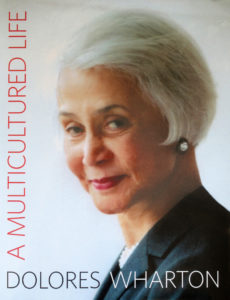EDITORIAL
‘There are no Caucasians present, though it would be difficult to distinguish them from many of those mingling in the mix of multi-hued wedding guests. Without exception, the guests are dressed fashionably, with stylish attire and stunning jewelry. The men are doctors, lawyers and undertakers; the women are school teachers and social workers … (The) waitstaff make their way through the crowd, bearing silver trays laden with chicken and crab croquettes, creamed sweetbreads on toast points, and slices of Virginia ham rolled with water cress – to accompany the Champagne punch served in crystal cups. Such is the life of many accomplished upper-middle-class Negroes along the Eastern Seaboard in the 1920s and 1930s.”
DOLORES WHARTON, from “A Multicultured Life”
With Determination, Discipline
The Whartons Led The Way

The quote, above, is Dolores Wharton’s earliest memory, recounted in “A Multicultured Life,” an engaging, irresistible memoir of not quite a century of American life, as she – in tandem with husband Clifton R. Wharton, Jr., the former SUNY chancellor (and much more) – moved from the nation’s black aristocracy to the heights of the American mainstream – in academe, industry and government.
Theirs is a soaring life story, of hard work, discipline, determination – and achievement.
Her husband was son of the first black U.S. ambassador (to Norway, 1961-64). He was a Harvard grad with a University of Chicago Ph.D., a Rockefeller envoy to South America and Malaysia, Michigan State president, then SUNY chancellor, TIAA-CREF CEO and reinventor, deputy secretary of State, and retiree to Cooperstown (summers and weekends year ’round), where he’s served on Bassett’s and other key community boards.
He recounted his astonishing career in a 2015 memoir, “Privilege & Prejudice,” a title that encompasses all the opportunities and obstacles to overcome.
Now, Dolores follows up with “A Multicultured Life,” which will be available Sept. 1 through the Michigan State University Press (MSUpress.org) and amazon.com. (Give yourself a treat: Buy it.)
“We were a team,” Dr. Wharton said in an interview at the couple’s aerie high above Otsego Lake, and Mrs. Wharton concurred. And yes, “Multicultured” and “Privilege” are stories of two loving companions overcoming life’s professional and personal challenges together, including the passing at age 49 of their oldest son, Clifton III.
Beyond that, at a time when women were just breaking into the American power structure, Mrs. Wharton, in her own right, had already arrived.
While in Kuala Lumpur in the 1960s, she discovered the fledgling field of modern Malaysian art (and introduced artists there to New York City’s avant garde). At Michigan State in the 1970s, she stood shoulder-to-shoulder with her husband before howling crowds of Vietnam protesters, but also expanded his office’s influence through her warm courtesy and considerateness.
In the 1980s and ’90s, she served as the first woman and first black woman on boards of directors of some of our most venerable corporations – from oil to utilities to Gannett during the creation of USA Today.
And – the source of her most satisfaction today – was using those contacts to create The Fund for Corporate Initiatives, preparing promising minority and women executives for top jobs “through intellectual and provocative interaction with stimulating professionals, instilling notable self-confidence as they moved up the corporate ladder.”
She retired FCI at the turn of the century, she recognized many, many individual companies had embraced and adopted its visionary model.
Through all this, yes, the Whartons encountered prejudice.
Most memorable, perhaps, was in “Privilege & Prejudice,” where young Clifton, raised overseas, had never encountered segregation. Until, that is, back home to attend Boston Latin, he and an aunt, on a visit to relatives in Virginia, were ordered into a black-only car when the train crossed the Mason-Dixon line.
As Dolores grew up in Danbury, Conn., the snubs were more subtle but hurtful nonetheless.
In both books, though, the Whartons mention but don’t dwell on these. Experiencing life at the top, making friends and meeting challenges predominate. The small-minded pettiness they encounter shrinks in the face of accomplishment.
While immersed in reading the “A Multicultured Life,” Joe Biden uttered his latest gaffe, “poor kids are just as bright and just as talented as white kids,” equating race and poverty.
Of course, the Whartons’ books present a dramatic counter-narrative, his and now hers: from her first memory of black prosperity, to a chance introduction to her husband in the Harvard Yard, to their wedding, hosted by Marian Anderson in her Connecticut studio, and to all that followed.
The lives they lived, the heights they reached, the good they achieved, are examples for all Americans – whites certainly, but blacks more urgently.
“It’s not to say there’s not a problem,” said the former SUNY chancellor. “But that” – poverty, and its grinding cruelty – “is not the only experience of the blacks.”
In an accusatory era rife with bitter argumentation – about race and much more – let’s keep believing, locally and nationally: The American Dream, while not a guarantee, can live. The Whartons’ triumphant lives prove it.

